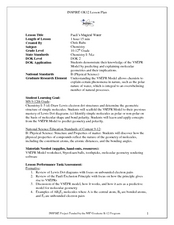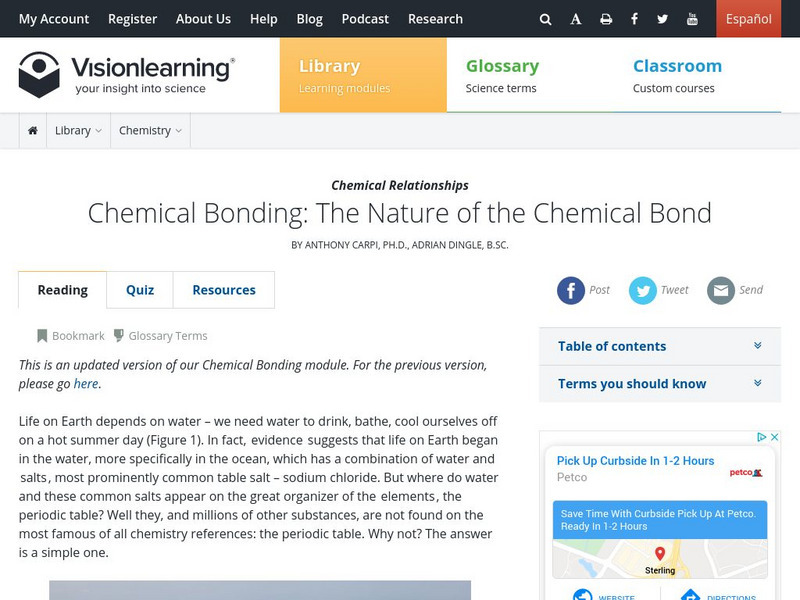Curated OER
VSEPR THEORY: BALLOONS AND MOLECULES
Students listen to the teacher introduce VSEPR theory and explain molecular geometry. They use balloons to visualize the shape of orbitals. Students create visuals of molecular orbitals with strings and balloons.
Curated OER
If My Configurations are Correct
Students write the electron configuration of elements in the ground state. In this chemistry lesson, students draw how subatomic particles are arranged in the atom. They construct Lewis dot diagrams of valence electrons.
Curated OER
Pauli's Magical Water
Students predict the shape of molecules using VSEPR theory. In this chemistry lesson plan, students differentiate a polar and nonpolar molecule. They discuss why water's polarity is very important.
Other
Organic Chemistry: Lewis/kekule Structures
This slide presentation contains a few slides that will be useful for students learning to write Lewis structures. A discussion of multiple bonds is included, and clear examples are shown.
Vision Learning
Visionlearning: Chemistry: The Nature of the Chemical Bond
This site talks about ionic, polar covalent, and non-polar covalent bonding.
Other
Lecture Notes From Chm 1341: Gilbert Newton Lewis
This lesson include biographical information, but it focuses on the concepts behind the "dot diagrams" that Lewis introduced.
University of California
Organic Chemistry Page: A Brief Tutorial on Drawing Lewis Dot Structures
An excellent lesson on writing Lewis structures. Examples shown include ammonium ion, carbon dioxide and the carbonate ion.
Other
Chemical Bonds: Formal Charges
A slide presentation with several slides dedicated to the topic of formal charges. Formal charges are explained, and examples are given. A practice example is provided.
American Chemical Society
Middle School Chemistry: Chapter 4: The Periodic Table and Bonding
Six middle school chemistry lessons about the periodic table and bonding complete with handouts and animations.
University of California
Resonance: Drawing Resonance Structures
An extensive lesson from UCLA on drawing resonance structures. Includes several examples, and links to related topics. Practice problems are also provided.
Towson University
Towson University: Drawing Lewis Structures
Brief rules for writing Lewis structures for simple compounds. Some examples are included.
Chem Tutor
Chem Tutor: Chemistry: Lewis Structures of the Elements
This colorful page goes over the proper techniques for writing Lewis structures for elements. This is a great place to begin learning how to write Lewis structures. When you are ready for a more advanced lesson, follow the link to learn...
Other
Chemical Bonds: Writing Lewis Structures
This slide show explains the rules for writing Lewis structures and then demonstrates an example. It then provides a practice example for the student to try.
Other
Chemical Bonds: Electronegativity
A slideshow with several slides dedicated to electronegativity, the trend which is illustrated in the slide at this link. Others slides explain how the electronegativity can be used to determine bond character.














